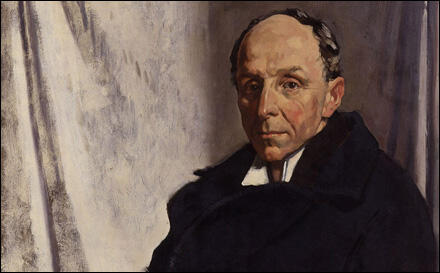Robert Cecil
Robert Cecil, the third son of the Marquis of Salisbury, was born on 14th September, 1864. Educated at Eton and Oxford University, he was called to the Bar in 1887.
A member of the Conservative Party, he was elected to the House of Commons in 1906. On the left of the party, Cecil was one of the few Conservatives who supported women's suffrage.
On the outbreak of the First World War Cecil went to work for the Red Cross. He was recalled in 1915 to serve in the government as under secretary for foreign affairs. The following year he was given responsibility for devising procedures to bring economic and commercial pressure against the enemy. In 1918 David Lloyd George appointed him as assistant secretary of state for foreign affairs.
Cecil's experiences during the war convinced him that civilization could survive only if it could develop an international system that would insure peace. In September 1916 he wrote a memorandum that advocated the formation of an international body that he called the League of Nations.
When peace negotiations began in October, 1918, Woodrow Wilson insisted that his Fourteen Points should serve as a basis for the signing of the Armistice. This included the formation of the League of Nations. Cecil was appointed as the British representative in charge of negotiations for this new organization.
The constitution of the League of Nations was adopted by the Paris Peace Conference in April, 1919. The League's headquarters were in Geneva and its first secretary-general was Sir Eric Drummond. The Covenant (Constitution) of the League of Nations called for collective security and the peaceful settlement of disputes by arbitration. It was decided that any country that resorted to war would be subjected to economic sanctions. 1958.

The main organs of the League of Nations were the General Assembly, the Council and the Secretariat. The General Assembly, which met once a year, consisted of representatives of all the member states and decided on the organization's policy. The Council included four permanent members (Britain, France, Italy and Japan) and four (later nine) others elected by the General Assembly every three years. The Secretariat prepared the agenda and published reports of meetings.
Cecil represented the Dominion of South Africa in the League Assembly. He was also president of the British League of Nations Union (1923-1945) and a leader of the International Peace Campaign.
In 1923 Cecil was granted the title Viscount of Chelwood. As a member of the House of Lords he remained in the government as Lord Privy Seal (1923-1924) and Chancellor of the Duchy of Lancaster (1924-1927). However he resigned from the government in 1927 because of its lack of support for the League of Nations.
Cecil, who was awarded the Nobel Peace Prize in 1937, wrote several books on international affairs including The Way of Peace (1928) and the Great Experiment (1941). He was present at the final meeting of the League of Nations and ended his speech with the words: "The League is dead, long live the United Nations."
Cecil's autobiography, All the Way, was published in 1949. He remained active in the House of Lords until his death on 24th November, 1958.

